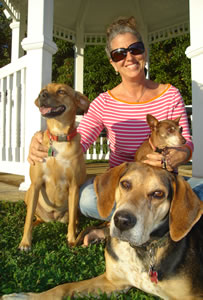Volunteering To Walk A Dog, Pet A Cat
A new volunteer program at KHS aims to make animals more socialized and relaxed, which will make them more attractive to potential adopteesSave more lives. That’s what Kaua’i Humane Society’s newly launched volunteer program aims to do.
“We are asking our volunteers to up their game hugely,” says the organization’s volunteer leader, Pam Woolway.
The restructured program trains volunteers in the art of enriching homeless animals’ lives. This, in turn, allows those with four legs to shine in a more favorable light for potential adopters. Socialized cats and dogs have a much higher likelihood of going home with somebody.
“Shelter life is a very unnatural environment,” explains Woolway.
When volunteers spend time with the dogs, for example, by walking or training them, adopters are not as overwhelmed by the animals’ excitement and energy when they visit.
“Everybody’s barking when you come in. They’re so happy to see you,” says Woolway, who also created a new volunteer center at the Puhi facility. “They can’t spend 24/7 behind bars and on concrete.”
Twice daily walks conducted by volunteers are part of the many activities Woolway is looking forward to scheduling on a regular basis through the inaugural program.Shifts for dog-walking begin every morning at 8. That way, by the time the first adopters visit at 11 a.m., “those dogs have already been out and had some play time and are more chill,” says Woolway.
Prior to the new program, which officially kicked off Jan. 7, volunteers were not offered training in animal handling, which could explain why the nonprofit was “hemorrhaging” helpers.
“You would do an orientation, and then you’d be basically thrown to the wolves,” says Woolway, who has worked for the KHS for more than a year.
When new executive director Shannon Blizzard came on board, her priority was to save more lives. In order to do so, the facility needed to be cleaner, and animals needed to have a more fulfilling shelter life. With only a skeleton staff, KHS has to rely on volunteers who needed to improve their skills and become more familiar with the animals. Now, everyone must take a mandatory animal-handling class after the initial volunteer orientation. The class covers the general body language of cats and dogs, and teaches volunteers how to safely retrieve all animals, including rabbits, at the shelter.
The final steps to becoming a KHS volunteer are an interview with Woolway and a training shift, where Woolway or a veteran volunteer is shadowed.
“I want a commitment and I want you to know exactly what goes on in here,” says Woolway, adding that it could take at least three weeks for KHS volunteers to be certified.
Volunteers are asked to commit at least two hours a week for the first four months. Currently needed most are dog walkers, cat groomers and cat cuddlers. While a buddy system is implemented for walking large dogs, other tasks such as socializing kitties can be done solo.
“Come in and spend 30 minutes in each of the three catteries: Listen to your iPod, read a book, let them crawl all over you,” says Woolway. “All they want is affection. It doesn’t take a lot from you. It’s what you’re going to do sitting at home anyway, so why not do it with a bunch of cats in your lap?”
Woolway hopes the new program will create a better sense of community at the shelter, and that volunteers will enjoy their experience.
“If they love each other and love us, then they’re going to be ambassadors for KHS,” says Woolway. “When people talk about us in a positive light, that they’re having a good experience here and that we’re a positive place to be, I think that is going to be more encouraging for our message of spay and neuter.
“We literally could not function without volunteers. They are as important as every single staff member.”
This month’s volunteer orientations will be held Feb. 11 from 9 to 10:30 a.m., and Feb. 28 from 3:30 to 5 p.m.
Call 632-0610, ext. 100, to register. Visit kauaihumane.org for more information.





